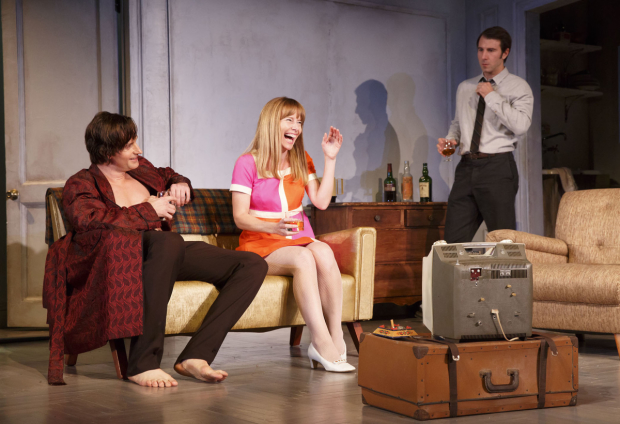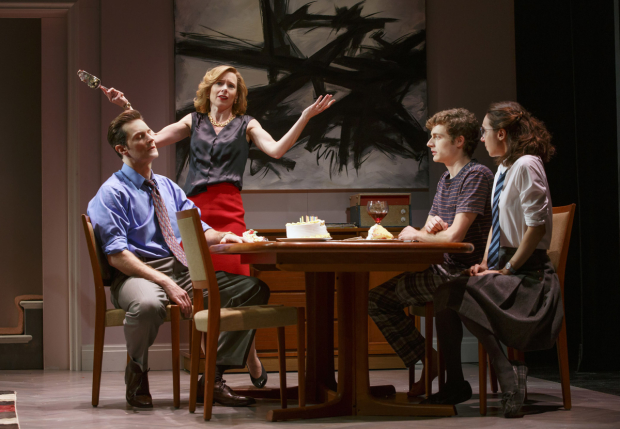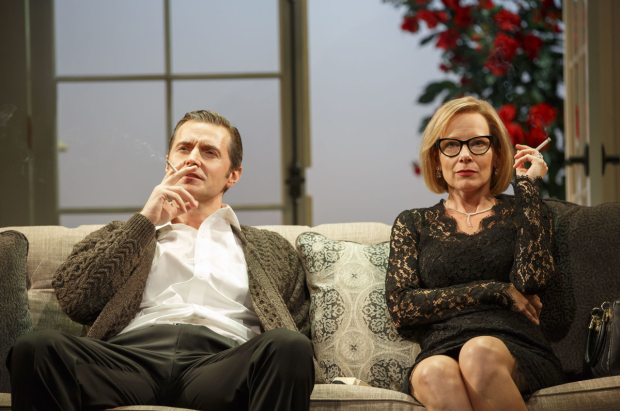Love, Love, Love

(© Joan Marcus)
"And in the end, the love you take is equal to the love you make." Mike Bartlett calls BS on the moral of this oft-quoted Beatles lyric with his new play, Love, Love, Love at the Roundabout Theatre Company. The title of this dark comedy is, of course, also taken from the gospels of John, Paul, George, and Ringo. In Bartlett's acerbic take on the archetypal baby boomer romance, the word "love" might alternately be replaced with "me."
The story begins in the swinging London of 1967. Henry (the handsomely stoic Alex Hurt) shares a grimy flat with his runaway brother, Kenneth (Richard Armitage). Wearing a red housecoat and clutching a snifter of brandy, it is clear that Oxford has had an impression on Kenneth. Still, he has decided to spend his summer break soaking in the counterculture flourishing in Britain's capital while his brother kindly pays for everything. Henry wishes Kenneth would make himself scarce when his date, Sandra (Amy Ryan), arrives. Surprise: He does nothing of the sort and 19-year-old Sandra ends up bonding far more with 19-year-old Kenneth than with poor, washed-up, 23-year-old Henry. Together with their generation, they're going to change the whole world.
The second act takes place in 1990, when Kenneth and Sandra share a comfortable house and two kids. Sixteen-year-old daughter Rose (Zoe Kazan) is as tightly wound as can be while 14-year-old Jamie (Ben Rosenfield) quite clearly has some special needs that no one wants to address. "We live in Reading. Something's gone wrong," observes Sandra as she sees the liberated adulthood of her teenage dreams slipping away.
Act 3 brings us up to 2011: Sandra and Kenneth approach their golden years while their adult children struggle in a radically transformed economy. As she approaches 40, ostensibly a failure and definitely worse off than her ancestors, Rose bitterly indicts her parents: "You didn't change the world, you bought it. Privatized it."
She may speak the truth, but that doesn't mean that the audience will be clamoring to join Team Rose. Through her shouty, red-faced performance, Kazan lets us know that Rose is the kind of person you try to avoid at a party.
That's not to say that her elders are much better: Simpering and preening in a dress apparently stolen from the wardrobe room at Rowan & Martin's Laugh-In, Ryan's Sandra comments on Kenneth's first act idleness: " It's very decadent. I like things that are decadent. Don't I Henry?" She obviously finds herself simply outrageous, a belief that she never really abandons, even in her 60s. As Kenneth, Armitage plays the kind of dopey hero who consistently wins at life, despite his best efforts at self-sabotage. No one is particularly likable in this play, and that is very much the source of its hilarity.

(© Joan Marcus)
Bartlett introduced himself to New York audiences as one of the most mischievous playwrights working today with his bisexual dramedy, Cock. It's a reputation he solidified with last season's Shakespearean future-history play King Charles III. A sly reference to Joe Orton in the first act offers a hint to his dramatic pedigree. Like Orton, Bartlett irreverently reveals human nature through the spectacle of perfectly awful characters getting away with everything. Some viewers (particularly those over the age of 52) might protest that his characters verge on caricature, but it is through the live combat of these artful stereotypes that generational drama becomes uproarious comedy.
Certainly, it offers a particularly fun challenge to a creative team. Director Michael Mayer (Hedwig and the Angry Inch) pushes the comedy to farcical proportions, especially in the riotous second act. Scenic designer Derek McLane has crafted three highly specific spaces for the three acts, clearly letting us know the economic fortunes of our protagonists through the decor.
Costume designer Susan Hilferty keeps the decades straight with her smartly chosen period costumes (Sandra's red skirt suit with shoulder pads in the second act is a memorable item), while Luc Verschueren does the same with his hair and wigs, which embody the perfect balance of the realistic and ostentatious. As staged by Mayer, it all feels like a decade-spanning Nora Ephron rom-com; one has the feeling that for Kenneth and Sandra, it is.

(© Joan Marcus)
Of course, that's not to say that everyone will have the same reaction. Responses to Love, Love, Love are likely to vary based on what decade you were born, so if you were born between 1946 and 1964, take the kids! You're certain to have a lively chat about it afterward. In his unforgiving construction and acid dialogue, Bartlett makes his perspective known, but not in a way that prevents anyone from justifying the destruction wrought by his two main characters. The story of an idealistic generation that grows up and sells out its values is not a new one, but in Bartlett's telling, boomers are to be hailed for their inordinate ability to cling to their generation's one unifying virtue: complete and utter selfishness.










